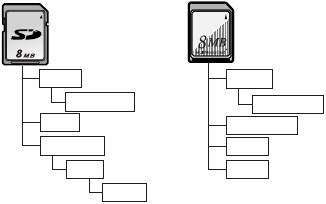
50
≥Using the optional DV Editing Software (Motion
DV STUDIO) for Windows (VW-DTM20/21/22),
variety of visual effects can be added and title
can be created.
≥You may not be able to properly play back or
search the images on the Movie Camera after
editing the recorded data or changing the image
data on a personal computer.
≥The image data files recorded on the Card with
this Movie Camera conform to the DCF (Design
rule for Camera File system) stipulated by JEITA
(Japan Electronics and Information Technology
Industries Association).
Constructing a Folder when the Card is
used with a PC
≥When a Card with data recorded on it is inserted
into a personal computer, folders will be
displayed as in the figure.
[100CDPFP]: The images (IMGA0001.JPG,
etc.) in this folder are recorded in
the JPEG format.
[MISC]: Files in which DPOF Data has
been set to the image are in this.
≥[DCIM], [IM01CDPF], etc. are necessary items
in the folder structure. They have nothing to do
with actual operations.
≥In the Card Photoshot Mode, the Movie Camera
automatically saves file numbers
(IMGA0001.JPG, etc.) along with the images.
The file numbers are recorded with each image
as a consecutive number.
≥The memory capacity indicated on the SD Card
label corresponds to the total amount of the
capacity to protect and manage the copyright
and of the capacity available as a conventional
memory for a Movie Camera, Personal
Computer or others.
Capacity that can be used as conventional
memory:
8MB Card: about 6,800,000 bytes
Cautions for Use
ªAfter Use
1
Take out the Cassette. (l 12)
2 Set the [VCR/OFF/CAMERA/M-CARD]
Switch to [OFF].
3 Take out the Card. (NV-DS65 only)
4 Detach the power supply and retract
the Viewfinder or the LCD Monitor
.
(
l 10, 13)
5 To protect the Lens, attach the
supplied Lens Cap.
ªCautions for Use
When you use your Movie Camera in a rainy or
snowy day or on a beach, make sure that no
water enters inside the Movie Camera.
≥Water may cause the Movie Camera or Cassette
to malfunction. (Irreparable failure may occur.)
≥If sea water splashes onto the Movie Camera,
wet a soft cloth with tap water, wring it well, and
use it to wipe the camera body carefully. Then,
wipe it again thoroughly with a soft dry cloth.
Keep the Movie Camera away from magnetized
equipment (such as a microwave oven, TV,
video game equipment, etc.).
≥If you use the Movie Camera on or near a TV,
images or sounds may be disturbed due to
electromagnetic wave radiation.
≥Do not use near a cell phone because doing so
may cause noise to adversely affect the picture
and sound.
≥By strong magnetic fields created by speakers or
large motors, recording on the tape may be
damaged, or images may be distorted.
≥Electromagnetic wave radiation generated by a
microprocessor may adversely affect the Movie
Camera, causing the disturbance of images and
sounds.
≥If the Movie Camera is affected by magnetically
charged equipment and does not function
properly, turn off the Movie Camera power and
detach the Battery or AC Adaptor and then
connect the Battery or AC Adaptor again.
Thereafter, turn on the Movie Camera power.
Do not use your Movie Camera near radio
transmitters or high-voltage lines.
≥If you record pictures near radio transmitters or
high-voltage lines, recorded images or sounds
may be adversely affected.
DCIM
100CDPFP
PRIVATE
VTF
TITLE
MISC
DCIM
100CDPFP
1M01CDPF
MISC
TITLE
EG-ENG.book 50 ページ 2003年1月6日 月曜日 午後3時43分


















